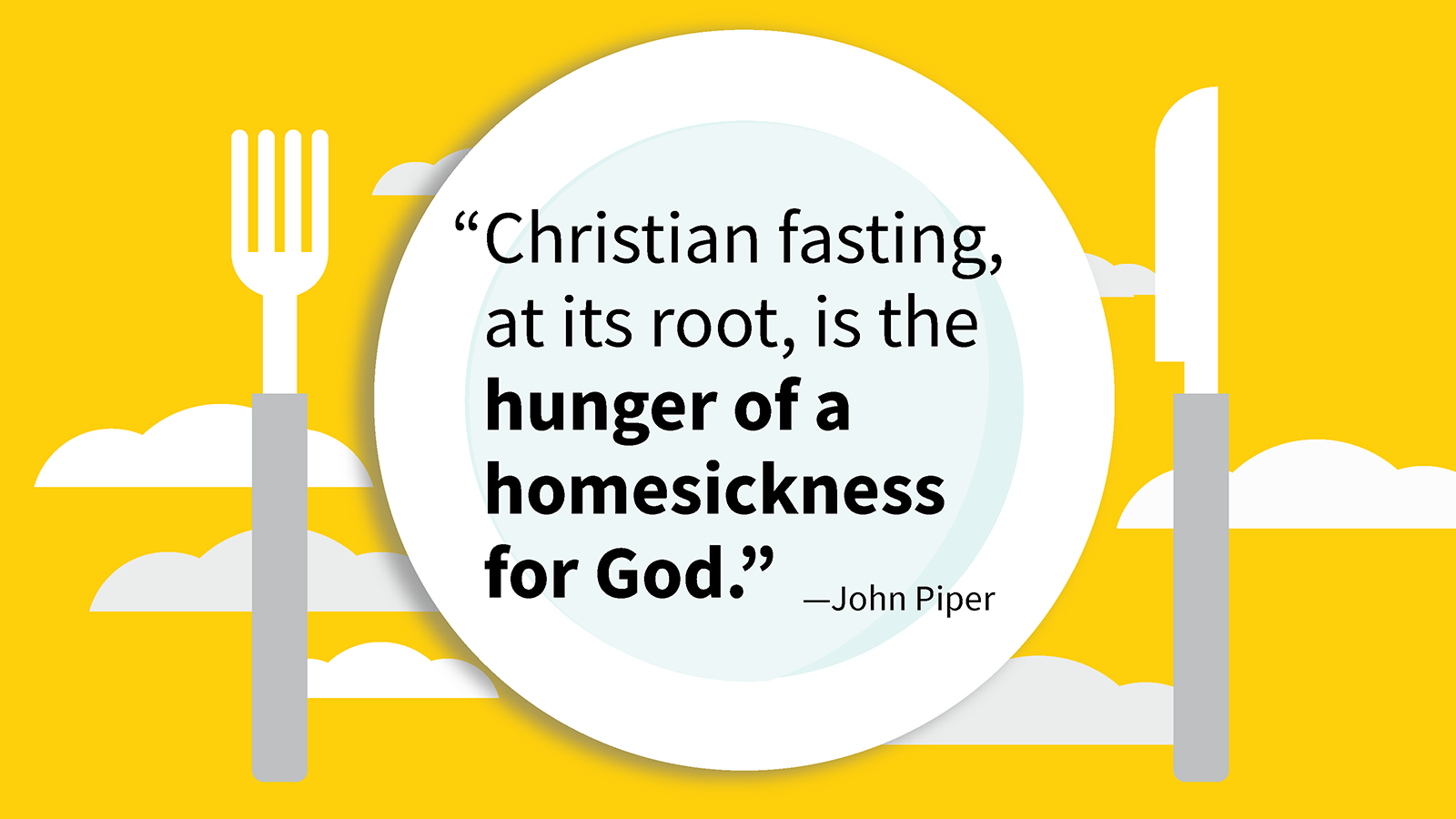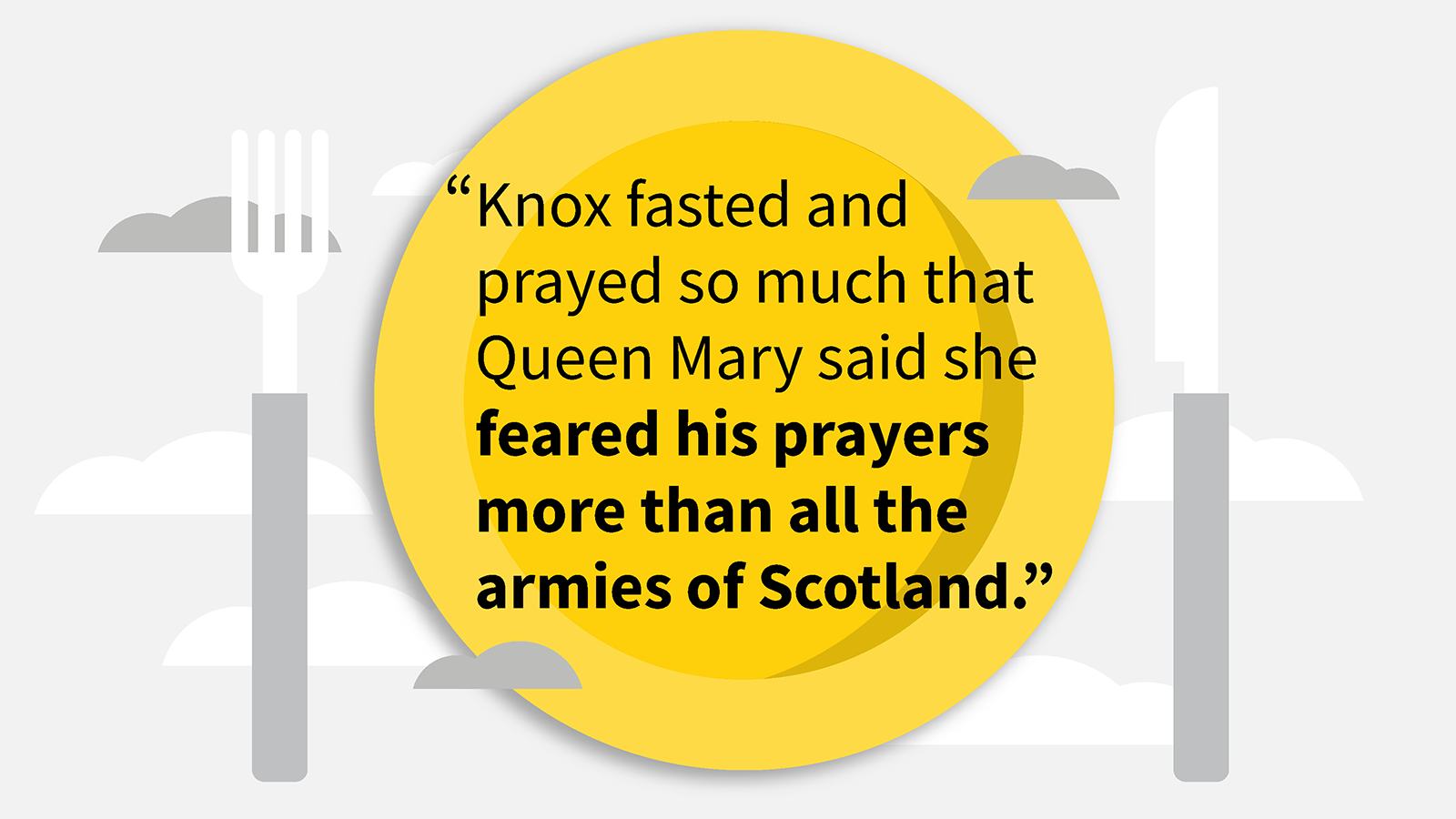
For thousands of years, biblical fasting has been the practice of abstaining from food for spiritual purposes. If you’re used to a routine of “three square meals a day,” going without food as a spiritual practice may sound strange. But fasting was a very common religious practice when the Bible was written.

In his book “Hunger for God,” John Piper writes: “Christian fasting, at its root, is the hunger of a homesickness for God. Christian fasting is not only the spontaneous effect of superior satisfaction in God, it is also a chosen weapon against every force in the world that would take that satisfaction away.”
But how does biblical fasting work — and how can someone do it today? In this guide, we’re going to cover what every Christian should know about fasting: what it is and how it works.
If you want to jump ahead, here’s what we’re going to look at:
Some Christians use the word “fast” when abstaining from pleasures besides food, like TV, internet or, for married couples, sex. You might know people who have gone on a “social media fast” or a “screen fast” for spiritual reasons. For the purposes of this article, we’re going to focus on traditional Christian fasting: abstaining from food.
Fasting might sound sensational today. But in Jesus’ culture, it was weird for a religious person not to fast.
The disciples of John the Baptist, an important prophet who prepared the way for Jesus’ ministry, often fasted. So did the Pharisees, a group of religious leaders who opposed Jesus’ teachings and conspired to kill Him!
During Jesus’ earthly ministry, His followers didn’t fast. But Jesus assumed they would fast after he returned to the Father (Luke 5:33–34). In His Sermon on the Mount, Jesus gives His followers instructions on how to fast, specifically telling them not to make a show of fasting like others in their culture (Matthew 6:16–18).
Jesus may not have commanded his followers to fast, but He expected them to.
Fasting is mentioned throughout the Bible, in both the Old Testament (written before Jesus’ ministry, death and resurrection) and the New Testament (written after). However, when Christians discuss fasting, two key passages often come up: one from the Old Testament prophet Isaiah and one from Jesus himself. But neither of these passages gives us specifics on how to abstain from food. Rather, both focus on the heart of the person fasting.
In Isaiah 58, God sees the nation of Israel abstaining from food for a day in order to seek help from God: justice for Israel and judgment on those who have oppressed Israel. However, the help does not come, and the people complain.
God turns the tables on Israel, pointing out how the Israelites are oppressing their own people. Employers withhold pay from the workers, and the people act violently toward each other. Through Isaiah, God tells the people that He doesn’t want them to go a day without food; He wants them to abstain from the ways they’ve oppressed one another.
“If you do away with the yoke of oppression,
with the pointing finger and malicious talk,
and if you spend yourselves in behalf of the hungry
and satisfy the needs of the oppressed,
then your light will rise in the darkness,
and your night will become like the noonday.” (Isaiah 58:9–10, New International Version)
The Israelites were merely putting on a show of fasting for God without truly following Him.
Likewise, when Jesus instructs His followers on how to fast, he tells them not to do so for show.
“When you fast, do not look somber as the hypocrites do, for they disfigure their faces to show others they are fasting. Truly I tell you, they have received their reward in full. But when you fast, put oil on your head and wash your face, so that it will not be obvious to others that you are fasting, but only to your Father, who is unseen; and your Father, who sees what is done in secret, will reward you.” (Matthew 6:16–18, NIV)
Christians shouldn’t fast in order to look pious or righteous. Fasting is a practice of humbling yourself before God. If you’re turning a fast into a spiritual ego boost, you’ve missed the point entirely.
The Bible is full of examples of people who have abstained from food to seek God:
Fasting is not limited to the believers the Bible mentions. Many of the church’s most important leaders during an important time in history known as the Protestant Reformation — including Martin Luther, John Calvin and John Knox — fasted. Knox fasted and prayed so much that Queen Mary said she feared his prayers more than all the armies of Scotland.

John Wesley, the renowned English preacher, missionary and founder of Methodism, fasted twice weekly from sunup until late afternoon. Charles Finney, a revivalist in the 1800s, fasted regularly each week and would often go three days without eating when he felt his revival meetings were not effectively introducing people to Jesus.
Biblical fasting is not a hunger strike between you and God. It can be easy to think of fasting as a way to add an extra oomph to your prayers. But biblical fasting isn’t so much about how God responds to your prayers: it’s more about how you bring your prayers to Him.
“God opposes the proud, but shows favor to the humble” (1 Peter 5:5, NIV; see 2 Samuel 22:28). Fasting is a means of humbling ourselves before God. In the Old Testament, fasting was often accompanied by other signs of humility and brokenness, such as weeping, mourning, and lamenting, as well as wearing sackcloth and sitting in ashes.
Bill Bright, Cru’s co-founder, made it his practice to fast and pray. He believed it played a vital role in what God did through him and through Cru as a ministry. He listed several benefits he gained from fasting:
It’s important to understand that fasting is not a way to get a better response to prayer. Rather, true fasting is a means of fostering a better (humbler) approach to prayer.
There are two types of fasts commonly practiced by Christians today:
1. A partial fast. This is described in the book of Daniel. For three weeks, Daniel, who was a prophet during a time when Israel lived in exile, abstained only from “delicacies” like meat and wine (Daniel 10:3).
2. A complete fast. A complete fast means drinking only water or sometimes juice when fasting for an extended period. Juice fasts will provide you with more energy than water-only fasts and still lead you into the humbling experience of denying your desire for solid, chewable food.
If you are new to fasting, start slow. Progressive steps help your body become accustomed to the drop in food intake. You can start by fasting for one meal a day, one day a week or one week a month.

The normal fast involves abstaining from all forms of food, but not from water, and commonly lasts 24 hours, from sunrise to sunrise. If you are fasting for the first time, you might begin by missing a meal or two. Over time, you can build up to a full day or more.
Begin by refraining from solid food, but drink liquids. Water is the best, since soft drinks are not good for the digestive system, and coffee and tea stimulate the nervous system. Before beginning a fast, it is best to eat lightly and cut back on caffeinated drinks. During the first few days of a multi-day fast, it is common to experience headaches as the body withdraws from caffeine.
If you are planning for an extended fast (more than 14 days), you should prepare mentally and physically by cutting down on food intake one week before the actual fast, taking on a vegetarian diet to control cravings for food. Reduce your intake of beverages like coffee, tea and soft drinks as well.
Drink plenty of water. (This is always a good idea — whether you’re fasting or not!)

During your fast, set aside specific and significant time to worship and seek God in prayer. Plan ahead so your time can be unhurried and conducive to enjoying the Lord. Many people begin this time by repenting of any sins the Holy Spirit brings to mind and asking for God’s forgiveness. This is essential to ensure that sin is not hindering your communication with God.
Then plan time to make your requests known to God and to seek His will. Take breaks to study Scripture passages you have chosen. Don’t rush your time with God. Take time to listen. Keep a notebook and pen nearby to record the ideas, insights, directions and instructions He impresses on your mind. When you turn down the “noise of Western civilization” by fasting, you can more easily hear God.
Continue to drink plenty of water. Apple or watermelon juice is a great morale booster. Sleep early — the first few days of the fast are usually the most challenging. Persevere through this period. Consult your doctor if you are unsure of any headaches or bodily reactions.

Breaking the fast may require as much discipline as beginning it. During the fast, your stomach contracts and your body’s digestive and elimination systems rest. The longer you fast, the more time the digestive organs need to reactivate before functioning at full speed.
If you plan to fast only a day or two at a time, it is best to end the fast with a small glass of fruit juice as your first meal. Gradually introduce small amounts of easily digestible foods such as yogurt, soup, fresh fruit, and cooked vegetables.
If your fast lasts longer than a few days, you should continue with juices for a day or more before gradually introducing more substantial foods like yogurt, soup and fruit. Be sure you introduce new foods in small quantities and that you chew it well. You should stop eating at the slightest sensation of fullness.
If fasting only a few days at a time, ending the fast should be easier. If you have built up to and desire to fast longer, you should consult your physician and review a health book on fasting.
According to “The Foods and Nutrition Encyclopedia,” “For healthy individuals, no harm results from short-term fasting.” The average healthy person can go without food between 21 and 40 or more days before the body begins to eliminate vital tissue (starvation). Consult your physician before beginning any fast lasting longer than three days.
If you have underlying health conditions such as pregnancy, anemia, behavioral disorders or other chronic health problems, you should never fast without consulting a physician first.

Bill Bright put it this way: It takes time to build your spiritual fasting muscles. If you fail to make it through your first fast, do not be discouraged. You may have tried to fast too long the first time, or you may need to strengthen your understanding and resolve. Keep trying until you do succeed. God will honor you for your faithfulness.
Fasting is a way God’s people have humbled themselves before Him for more than three thousand years! Jesus, David, and many other followers of our God have gone without food for a little while to worship and pray to the one who supplies all our needs.
Praise God: the one who hears and answers our prayers!
©1994-2020 Cru. All Rights Reserved.